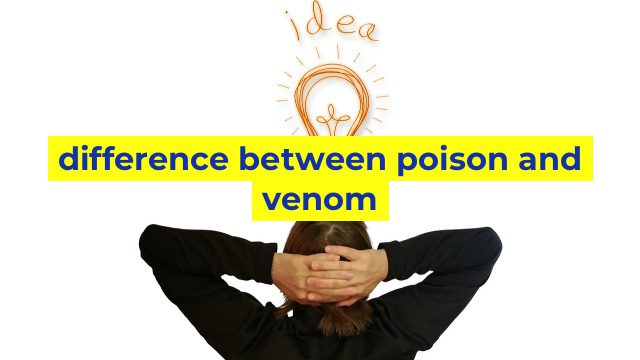The Difference Between Poison and Venom Explained
What is Poison?
Poison is a substance that harms or kills when ingested or absorbed. Poison can enter the body through the mouth, skin, or respiratory system. It can cause a range of symptoms from mild discomfort to severe illness or death. Poisonous substances are typically found in plants, animals, and synthetic materials. For example, cyanide is a highly toxic poison that can be found in some plants, while lead is a poisonous metal found in some household items.
What is Venom?
Venom, on the other hand, is a toxin that is injected into the body of another animal or human through specialized structures such as fangs or stingers. Venom is typically produced by certain animals like snakes, spiders, scorpions, and bees, among others. Unlike poison, venom is used for defensive or offensive purposes. Venoms can cause a range of symptoms, including pain, swelling, and even death, depending on the type of venom and the amount that has been injected.
How to Differentiate Between Poison and Venom?
The main difference between poison and venom is the way they enter the body. Poison is absorbed or ingested, while venom is injected through specialized structures. Poisonous animals do not have specialized structures to inject their toxins, while venomous animals do. Another difference is their function. Poison is used for defensive or offensive purposes, while venom is used to paralyze or immobilize prey or predators.
Implications for Humans
It’s important to understand the difference between poison and venom for humans, especially in terms of first aid and medical treatment. If someone has ingested or absorbed a poison, it’s important to seek medical attention immediately. On the other hand, if someone has been bitten or stung by a venomous animal, it’s essential to identify the type of animal and seek emergency medical attention as soon as possible. Proper identification of the animal can help healthcare professionals provide the right treatment and antidote.
In conclusion, the difference between poison and venom is significant. Poison can harm or kill when absorbed or ingested, while venom is a toxin that is injected through specialized structures such as fangs or stingers. Understanding the difference can help in proper identification and medical treatment, which can ultimately save lives.
Table difference between poison and venom
| Attribute | Poison | Venom |
|---|---|---|
| Delivery Method | Ingestion or absorption through the skin | Injected by fangs, stingers, or spines |
| Producer | Plant or animal | Animals (e.g. snakes, spiders, scorpions) |
| Purpose | Defense mechanism or deterrent against predators | Used for hunting or self-defense |
| Chemical Composition | Usually alkaloids or glycosides | Proteins, enzymes, or peptides with various effects on the body |
| Effects on Humans | Mostly cause harm if ingested or absorbed in high doses | Can cause various symptoms depending on the type and amount of venom injected, ranging from mild pain and swelling to paralysis or death |
